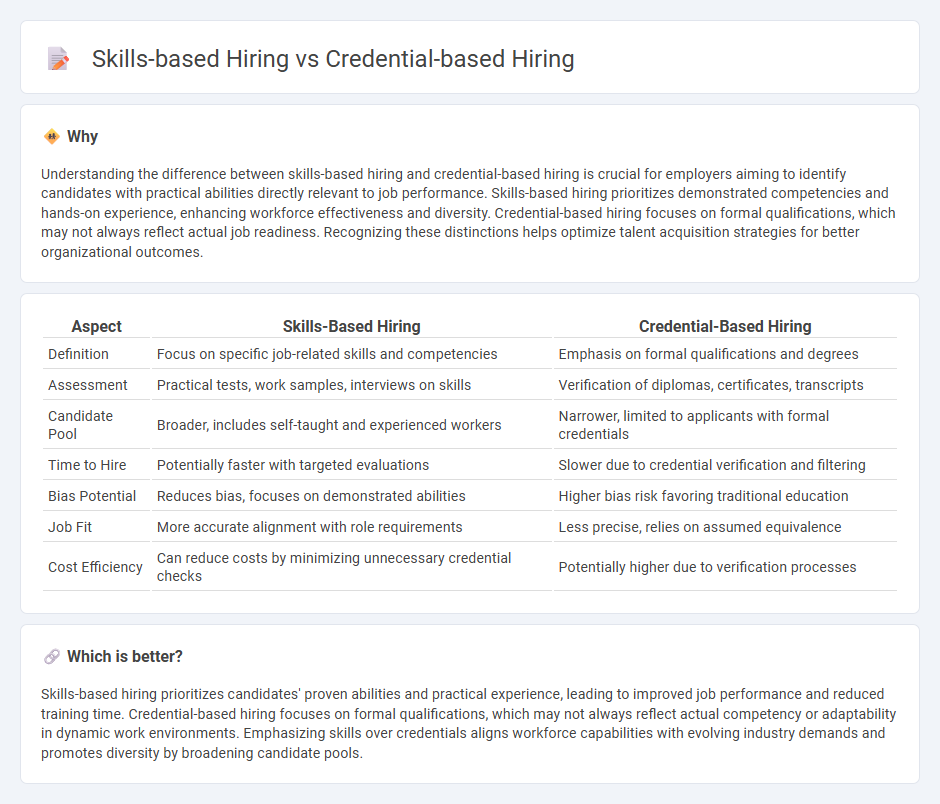
Skills-based hiring focuses on evaluating candidates' practical abilities and job-related competencies rather than formal educational credentials, enabling employers to identify talent through demonstrated expertise and relevant experience. Credential-based hiring relies heavily on degrees, certifications, and formal qualifications as primary indicators of suitability, often limiting candidate pools to those with specific educational backgrounds. Discover how shifting toward skills-based hiring can enhance workforce diversity and productivity by exploring its benefits and implementation strategies.
Why it is important
Understanding the difference between skills-based hiring and credential-based hiring is crucial for employers aiming to identify candidates with practical abilities directly relevant to job performance. Skills-based hiring prioritizes demonstrated competencies and hands-on experience, enhancing workforce effectiveness and diversity. Credential-based hiring focuses on formal qualifications, which may not always reflect actual job readiness. Recognizing these distinctions helps optimize talent acquisition strategies for better organizational outcomes.
Comparison Table
| Aspect | Skills-Based Hiring | Credential-Based Hiring |
|---|---|---|
| Definition | Focus on specific job-related skills and competencies | Emphasis on formal qualifications and degrees |
| Assessment | Practical tests, work samples, interviews on skills | Verification of diplomas, certificates, transcripts |
| Candidate Pool | Broader, includes self-taught and experienced workers | Narrower, limited to applicants with formal credentials |
| Time to Hire | Potentially faster with targeted evaluations | Slower due to credential verification and filtering |
| Bias Potential | Reduces bias, focuses on demonstrated abilities | Higher bias risk favoring traditional education |
| Job Fit | More accurate alignment with role requirements | Less precise, relies on assumed equivalence |
| Cost Efficiency | Can reduce costs by minimizing unnecessary credential checks | Potentially higher due to verification processes |
Which is better?
Skills-based hiring prioritizes candidates' proven abilities and practical experience, leading to improved job performance and reduced training time. Credential-based hiring focuses on formal qualifications, which may not always reflect actual competency or adaptability in dynamic work environments. Emphasizing skills over credentials aligns workforce capabilities with evolving industry demands and promotes diversity by broadening candidate pools.
Connection
Skills-based hiring emphasizes candidates' practical abilities and competencies directly relevant to job performance, while credential-based hiring focuses on formal qualifications like degrees and certifications. Both approaches intersect by validating a candidate's suitability: skills demonstrate capability, and credentials often serve as standardized proof of those skills. Integrating these methods enhances talent acquisition by balancing demonstrated expertise with recognized educational or professional achievements.
Key Terms
Qualifications
Credential-based hiring emphasizes formal qualifications such as degrees, certifications, and institutional endorsements, often valuing academic achievements over practical experience. Skills-based hiring prioritizes demonstrable abilities and hands-on expertise relevant to the job, allowing employers to assess candidates' real-world competency beyond traditional credentials. Explore the advantages and challenges of these hiring approaches to determine the best fit for your organization's talent acquisition strategy.
Competencies
Credential-based hiring emphasizes formal qualifications such as degrees and certifications, while skills-based hiring prioritizes demonstrated competencies and practical abilities relevant to job performance. Competency-focused hiring improves workforce agility by aligning candidate skills with organizational needs, fostering better job fit and productivity. Explore how shifting to competency-based hiring can transform your talent acquisition strategy.
Assessment
Credential-based hiring emphasizes academic degrees and certifications as primary indicators of candidate qualifications, often limiting the candidate pool to those who meet specific formal education criteria. Skills-based hiring prioritizes practical abilities and competencies demonstrated through assessments, work samples, or on-the-job experiences, enabling employers to identify talent beyond traditional credentials. Explore how assessment methods can enhance hiring accuracy and inclusivity in modern recruitment strategies.
Source and External Links
Skills-Based Hiring: The Life of a Credential - Credential-based hiring traditionally focuses on education and past jobs, but skills-based hiring uses digital credentials to directly show candidates' skills aligned with job needs, providing a clearer, more complete picture for hiring decisions.
The Case for Skills-Based Hiring - Raise Recruiting - Credential-based hiring relies on degrees and experience as proxies for skills, which may not accurately predict job performance; skills-based hiring instead tests candidates on actual job skills through practical assignments, improving hiring success.
Skills-Based Hiring: Why It's Time to Rethink Hiring - Moving from credential-based to skills-based hiring expands talent pools and diversity, leads to better hires, and is increasingly adopted by employers who validate skills through assessments and data-driven methods.
 dowidth.com
dowidth.com